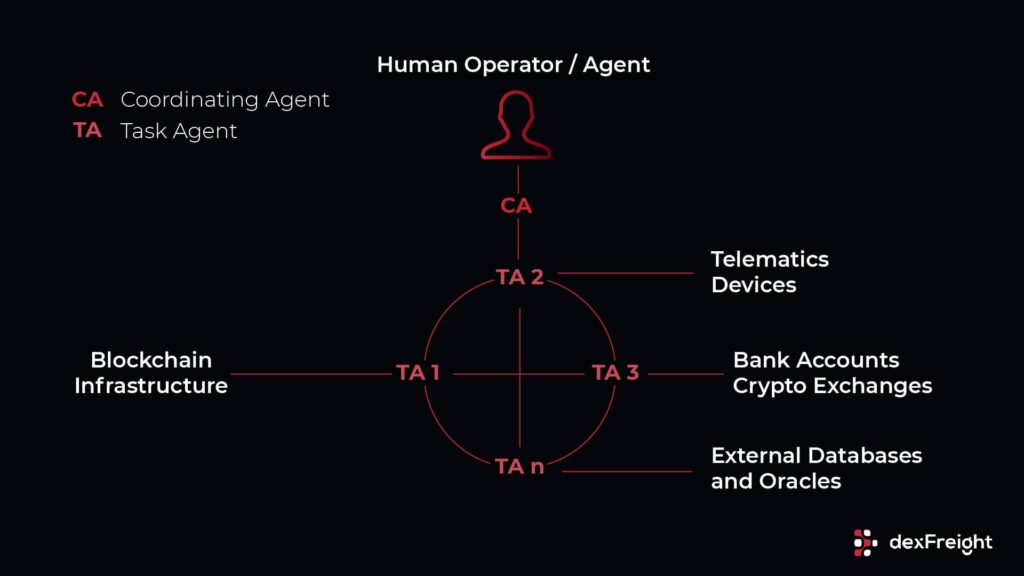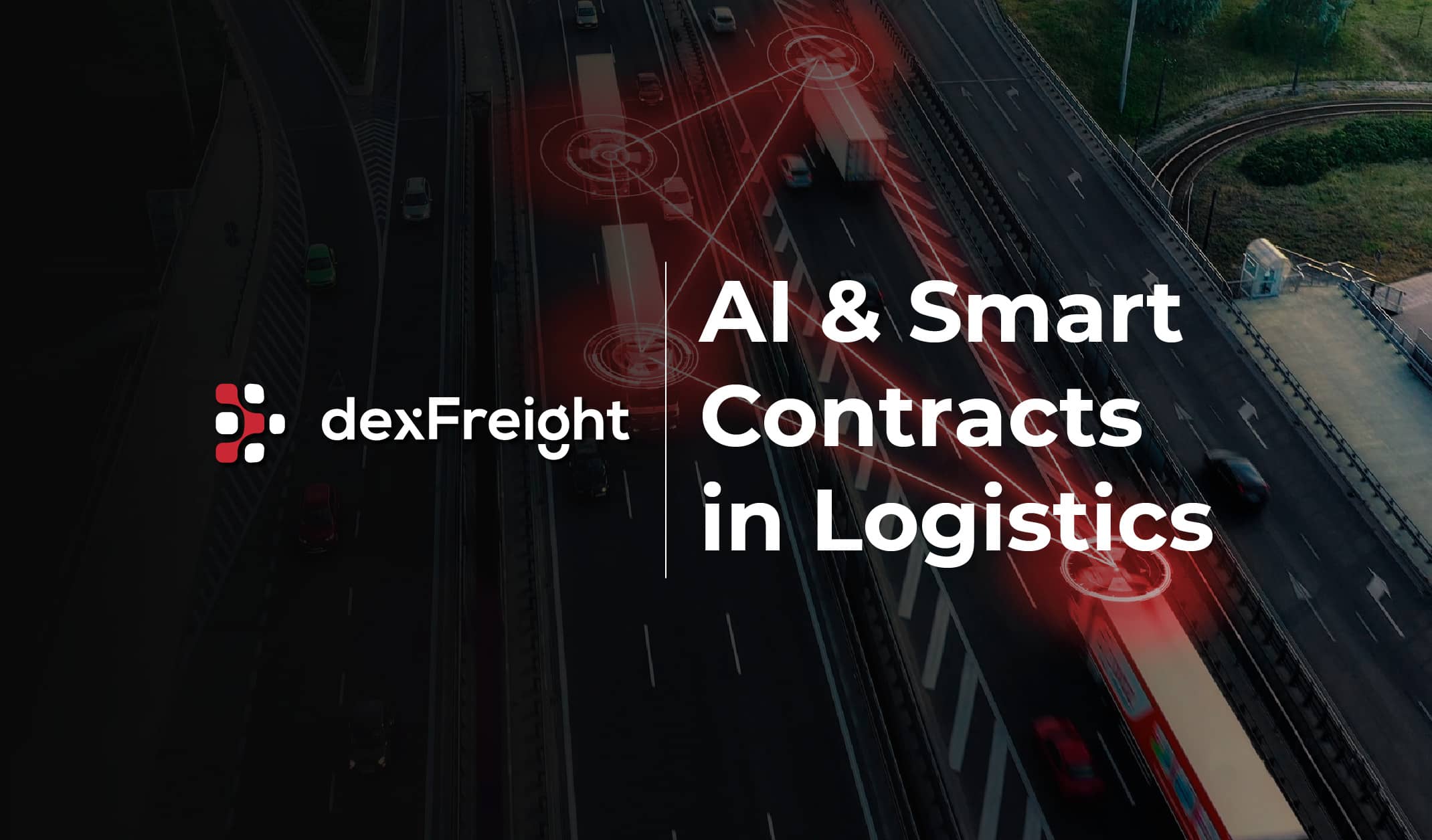dexFreight has embarked on a journey to build an AI-powered collaborative system to automate logistics workflow.
Shipment processing requires multiple and sometimes independent decisions using information such as market conditions, past experience, business goals, etc.
In this blog post, we describe a future in which workflows performed by freight brokers and shippers to process shipments are partially or fully automated using software components that not only perform repetitive tasks but also make decisions on their own by collaborating with other internal and external components. While robotic process automation is suitable to manage repetitive tasks, supplementing the “robots” with AI capabilities to think and learn takes workflow automation to a whole new level. dexFreight has embarked on a journey to build an AI-powered collaborative system to automate logistics workflow.
Automating 3PLs and Freight Brokers Operations
Third-party logistics and freight brokers are an integral part of the logistics process in the US and worldwide. They provide a valuable function to millions of shippers to find and onboard carriers and other conveyance methods, performing necessary paperwork, evaluating safety and liability risks, tracking shipments, dealing with service exemptions, issuing payments, financing, etc.
At present, brokers use multiple applications to accomplish those tasks. Freight brokers differentiate from their competition by the level of automation they can do in the workflow and process more shipments in less time. Obviously, this workflow has many repetitive tasks and also tasks that require experience and operational collaboration with carriers, factoring companies, and other services.
If you have attended freight, supply chain events in the past, an overwhelming number of vendors including dexFreight, are selling workflow automation for freight brokers/shippers and carriers. Individuals who have seen the industry evolve say that they’ve never seen this much automation being marketed. That only means, workflow automation will continue to gather momentum.
With the ever increasing power of AI and API integrations, it is not difficult to see a future when freight brokers (and shippers) will be able to use systems or applications powered by virtual agents called “task agents” (TA). These agents can self modulate, have autonomy, and collaboration capabilities, etc. They can learn using AI from past experiences and decide on their own to trigger a set of actions and react to outside events.
Task Agents
If we are to create a fully or partially automated workflow with minimal human interventions, we anticipate workflow will be performed by multiple and independent Task Agents (TAs) collaborating with each other. Bidding, booking, vetting, tracking, risk assessment, payment, dispute resolutions, decision intelligence, risk predictions, and more will function as TAs with AI to improve themselves and collaborate with other TAs.
These TAs will be managed by a Coordinating Agent (CA) on the top. We posit that a human agent (in our use case, a broker) will sit on top of the coordinating agent because human computing ability is still exponentially higher than with any AI available out there when it comes to thinking rationally and utilizing past experience in making decisions. Human agents will be equipped with a kill switch in case things go wrong and also when exceptions have to be handled that are beyond the capability of AI.
Each TA will have several modules to receive inputs, process, predict, and output (send and receive data, trigger transactions, etc.) They will be connected with IoT devices, obtain shipment status from telematics, automated trucks, AI to predict risks, trigger payments, etc. and a continuous feedback loop of performance metrics to improve the agent itself.

The coordinating agent looks after the overall functioning of task agents. The CA is the most difficult to program and build because its focus is not completing tasks, but anticipating issues and intervene, which can be subjective. The use of AI in building TA is well studied and research in this space has been going on for decades.
We are projecting that smart contracts will play a significant role in building TA and may even expedite the development of TAs.
The Role of Smart Contracts
Smart contract in its current design plays the role of imperfect executioner and enforcer. It is highly deterministic in its logic with no room for flexibility. That’s why the most predominant use case of smart contracts has been issuing tokens in exchange for another token. Although, its use case is rapidly expanding into workflow automation as an executioner of logic (that is untampered) and an enforcer by adding/anchoring transactions into the immutable blockchain.
We think smart contracts are suitable for TAs to execute the terms and enforce them with other agents and with outside systems. For example, the payment agent will issue payments to carriers and factoring companies’ systems, and receive payments from shippers via API. Payment is then distributed to other task agents via the coordinating agent. TAs will use those funds to buy computing power and other resources such as updating their AI models.
Because of smart contracts, these TAs can now hold funds and transfer balances, which allows them to take part in an economic structure of the system.
Pathway to Implementation
- Stage 1 (now): Workflow automation application is divided into functional task agents implemented as microservices (in containers) or robotic process automation with AI but limited collaboration capabilities. Coordinating agent’s roles will be limited to monitoring the individual agents and informing human operators. Task agents have to be triggered by the freight broker’s operations staff at all times.
- Stage 2: Microservices will evolve with advanced AI to collaborate with other microservices and function like task agents. Coordinating agents will be built with advanced AI capabilities to monitor how the task agents function and perform. Humans will still intervene during workflow exceptions.
- Stage 3: Task agents will evolve to become automated (and to some extent autonomous) with the ability to maintain themselves, collaborate with other agents, buy computing power, draw and spend resources. Exceptions will be gradually shared between task agents and coordinating agents.
- Stage 4: The entire or majority of the TAs will evolve into autonomous agents. At this stage, coordinating agents will play a much bigger role managing some level of exceptions instead of human users, which will still exist as controllers of the coordinating agent.
- Stage 5: We’ll be part of a Matrix by then. Some of us will be in a dilemma whether to choose red or blue pills.
Implications to the industry
It’s a matter of time when this kind of virtual agent-based freight management and brokerage systems will be built. These systems with collaboration capabilities underneath are already being used in fintech, mining, space programs, etc. When they do appear in logistics, we anticipate that the role of freight brokers and dispatchers will evolve to supervise the coordinating agent and handle critical exceptions. We don’t see these systems completely replacing human agents any time soon.
In Conclusion
Building task agents with collaborative capabilities is extremely difficult due to the fact that a complex workflow includes dozens if not hundreds of individual task agents and the number of interactions between each other and within themselves can be extremely large. Programming such a large number of interactions is nontrivial. dexFreight’s mission is to build an AI-powered collaborative system to automate logistics workflow.

CIO and Co-founder at dexFreight



